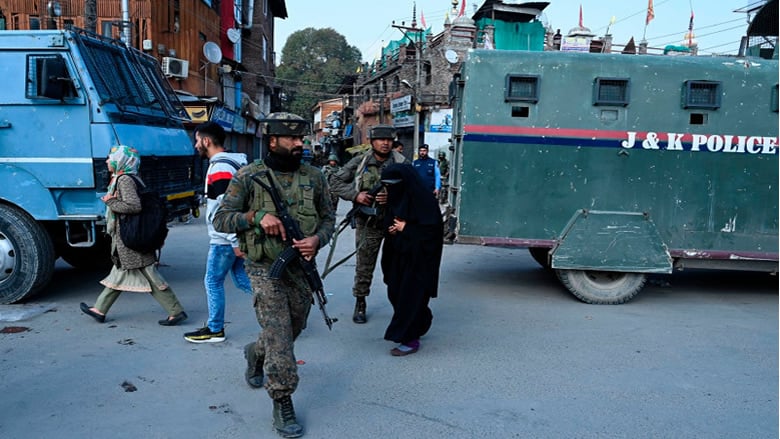In 1989, as Soviet troops withdrew from Afghanistan, another Pakistan-sponsored insurgency flourished as resistance to Indian rule in Kashmir flared. The battle in Jammu and Kashmir, a border region long disputed by India and Pakistan, has linked its fate with Afghanistan—and Kabul is still caught in the crossfire between Islamabad and New Delhi.
Since New Delhi revoked the special status of Jammu and Kashmir in August and began a sweeping clampdown, there have been many reports of Kabul’s support for India’s approach to Kashmir. But while Afghan public opinion is generally hostile to Pakistan, the position on Kashmir is muddled, changing and not entirely favorable to New Delhi. These divergent perspectives not only have implications for the country’s future but also reveal the limits of India’s influence in the region despite its long-standing soft-power campaign to shape public perception in its favor.
India’s soft power is touted as a key factor in its relationship with Afghanistan. India is one of Afghanistan’s largest donors and has supported the investment of several key infrastructure projects, including the financing of Kabul’s new parliament building. Indian cultural exports like Bollywood influence the mindset of Afghanistan’s youth, helping to cement the long-standing ties between the two countries. As such, Afghans generally perceive New Delhi as a stabilizing force in the region. In contrast, because of Pakistan’s military’s relationship with the Taliban and other Afghan militants, along with ongoing hostility and clashes along the border, Afghans are more apt to view Pakistan negatively. Large scale anti-Pakistan protests, such as the ones in 2014 and 2017, illuminate this.
On Aug. 5, Jammu and Kashmir lost the nominally autonomous status it was granted on being ceded to India in 1947. To enforce the move, New Delhi sent an additional 38,000 Indian security forces into the region, severed all forms of communication, and arrested top Kashmiri politicians. As the lockdown continued, several Pakistani policymakers were quick to link the issue to then-ongoing peace talks in Afghanistan between the United States and the Taliban, seeking to persuade Western policymakers to put pressure on India.
Both Kabul and the Taliban rebuked this linkage, emphasizing the bilateral nature of the Kashmir conflict. Former Afghan intelligence director Amrullah Saleh was quick to side with India and tweeted that India alone holds the power to change the status of Kashmir. He accused Pakistan of producing “brain washed Madrasa terrorists” who killed Afghan civilians “just because they are not anti India.”
In contrast to many who view the Afghan Taliban as purely a Pakistani military proxy, the Taliban’s statement on Aug. 8 that urged India and Pakistan to exercise restraint was surprisingly neutral, reflecting its prioritization of national issues over international Muslim solidarity. “The Taliban have always claimed to be a nationalist movement. … They usually do not comment on other countries’ oppression of Muslims, apart from some vague statements of saying they want freedom for all Muslims,” said Mohammed Harun Arsalai, an Afghanistan-based journalist and co-founder of Documenting Afghanistan.
The positions of political actors in Afghanistan have ranged from neutral to explicitly pro-India, primarily for India’s support for the Afghan government as well as anti-Pakistan animus.The positions of political actors in Afghanistan have ranged from neutral to explicitly pro-India, primarily for India’s support for the Afghan government as well as anti-Pakistan animus. But our discussions with journalists and Afghans in the region show the popular reaction is decidedly more nuanced. Many working-class Afghans, drawing from their own experiences of conflict and oppression, identify with Kashmir’s Muslims. This perception is understandable, as Arsalai said: “People who have seen a lot of the [ongoing] war understand oppression in a very real way.”
Yet, although many Afghans are sympathetic to the Kashmiri cause, the regional power dynamics muddle the popular discourse. As with pro-India elites, there is a palpable anger among some middle- and working-class Afghans at Islamabad’s continued interference in their country, compounded by violent border skirmishes and the mistreatment of the Pashtun minority in Pakistan. This negative perception of Islamabad has led some Afghans to side with India on any issue that is anti-Pakistan, sometimes to an extent that discernibly downplays or even whitewashes India’s actions in Kashmir.
Arif Khan (a pseudonym), a taxi driver and former 1980s mujahideen fighter based in Kabul, relayed a similar sentiment to us. He sympathized with the Kashmiris for what they experienced and often wished that the mujahideen continued to Kashmir to help liberate it from Indian rule. But when asked about the situation in Kashmir today, he said, “This all has to do with Pakistan. Pakistan is meddling there and here. They’re keeping our country behind and holding Afghanistan back and using the country as a funneling route for weapons, drugs, and other things.”
This geopolitical interpretation of the Kashmir issue seems to be popular among the Afghan diaspora, but their more nuanced take is perhaps a reflection of their experiences of leaving the conflict-ridden country and looking at the issue from a distance. Suraia Sahar, an Afghan Canadian activist who works extensively with the Afghan diaspora and refugee communities, said Afghans are generally supportive of Kashmiris but also understand that both India and Pakistan are meddling to advance their own interests in Afghanistan. She added: “Any honest discourse will recognize both states as threats to the autonomy of neighboring regions. … On one hand, we can see Pakistan’s insincerity in human rights advocacy with their brutal treatment of Baloch and Pashtuns. But India’s cruel policies targeting Muslims in India foreshadows what’s to come for Kashmiris.”
Afghans are closely watching the actions of Indian Prime Minister Narendra Modi’s government in Kashmir and throughout the region. That should be a reality check for New Delhi; its courting of Afghan opinion can only go so far. India may have the funding and power to shape public opinion and support in Afghanistan, but it will take much more to overcome growing mistrust.





